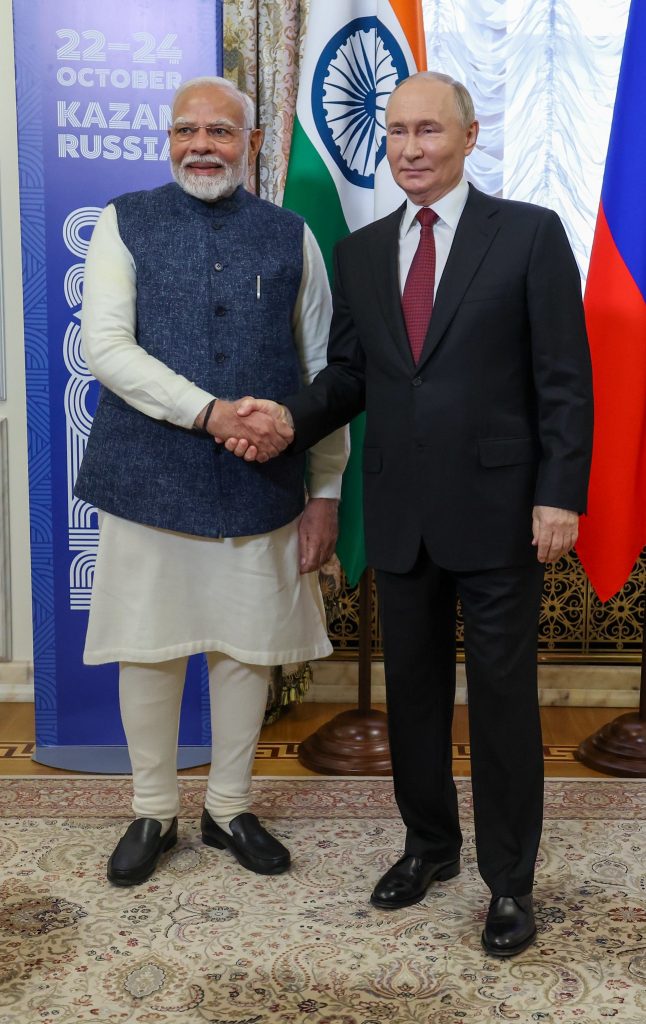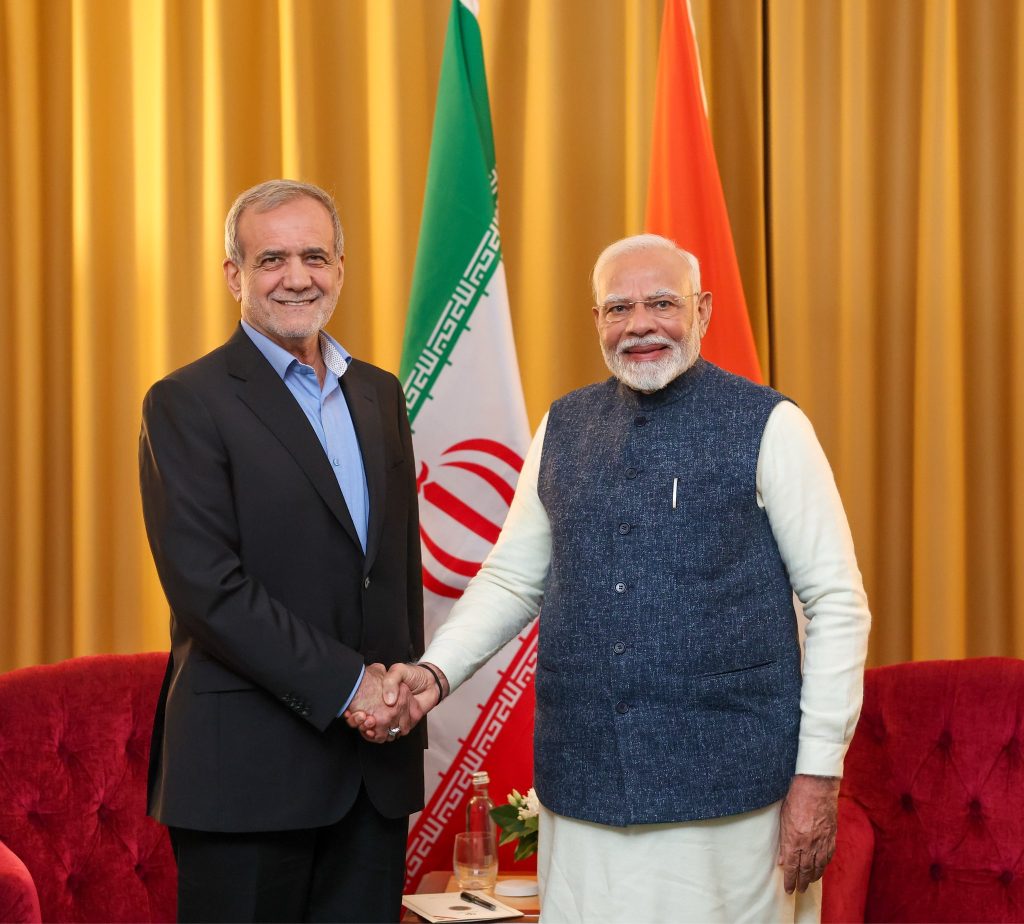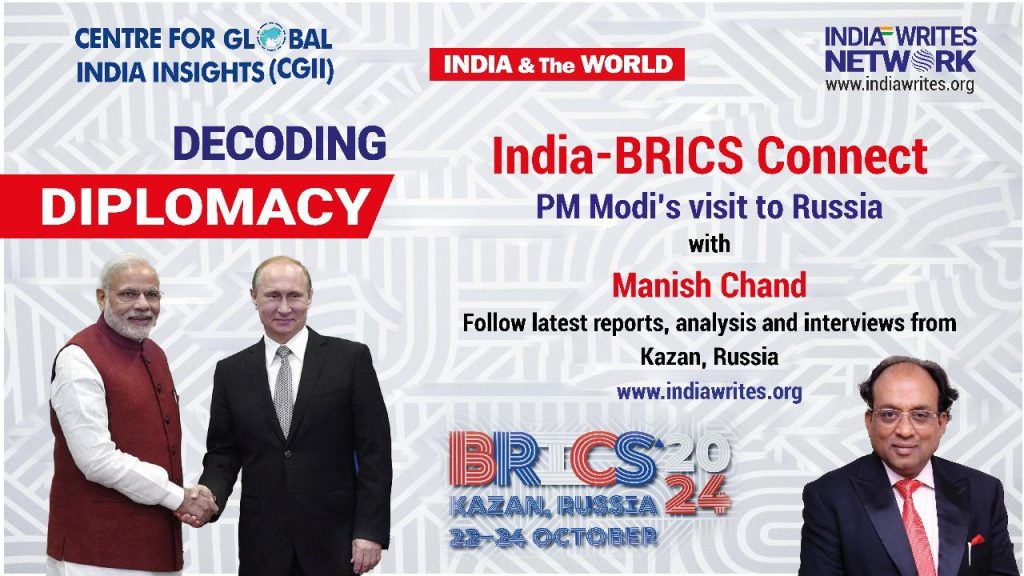
Kazan (Russia): In a major breakthrough, India and China decided to defrost their conflicted ties by setting up the first bilateral meeting between Prime Minister Narendra Modi and Chinese President Xi Jinping in Kazan on October 23.
Ending speculation, India’s Foreign Secretary Vikram Misri announced the meeting between the leaders of India and China on the sidelines of the BRICS summit at a press briefing in Kazan, signalling a new beginning in troubled relations between Asia’s leading economies.
Confirming the meeting, Mr Mistri confirmed the agreement on restoring patrolling rights to pre-2020 position, and indicated that the disengagement of Chinese troops from the remaining friction points in Demchok and Depang has been completed.
“What it will entail is that in the pending areas under discussion, patrolling and indeed grazing activities, wherever applicable, will revert to the situation as it obtained in 2020,” Mr Misri clarified when asked about the patrolling agreement reached with China.
The meeting between PM Modi and President Xi is expected to take place in the afternoon on October 23, the last bilateral meeting he will hold before departing for New Delhi. Mr Mistri refused to go into details about the themes of discussion between the two leaders and was circumspect about the way forward for India-China relations. However, highly-placed sources indicated that there is a strong possibility of the Modi-Xi meeting leading to a revival of the dialogue process, which was suspended after the Galwan killings in the summer of 2020.
Mr Mistri’s announcement about the patrolling deal in New Delhi, a day before PM Modi’s departure for Kazan had fuelled speculation about a thaw in India-China ties.
The thaw has been in the making for the last few months with the foreign ministers of India and China holding two meetings in Astana and Vientiane and intensive diplomatic and military negotiations. “Over the last several weeks, Indian and Chinese negotiators have been in close contact across various forums. As a result of these discussions, we have reached an agreement on patrolling arrangements,” Mr Mistri said in New Delhi. During his press briefing in Kazan, he confirmed that the two sides would now take the “next steps” to implement disengagement and resolve issues that arose in 2020.
The new arrangement covers not only areas where disengagement has already taken place but also extends to the previously unresolved friction points of Demchok and Depsang.
BRICS seems to be good news for India-China relations. The thaw in Kazan is reminiscent of the BRICS summit in Xiamen in 2017, where the two leaders had met after the Doklam issue was resolved just ahead of their meeting in the Chinese city.
Modi-Puttin bonding
India also bolstered its all-weather friendship with Russia as PM Modi and Russian President Vladimir Putin held bilateral talks and focused on ramping up economic, energy and defence ties. The one-liner in Kazan that will resonate for many years was Putin’s light-hearted remark to PM Modi that the two leaders don’t need a translator to understand each other. “You understand me without a translator. “We have such a relationship that I felt that you do not need any translation,” said Putin, eliciting a spontaneous laugh from PM Modi.

In his opening statement, President Putin emphasized the deep bond between India and Russia, highlighting their strong cooperation within BRICS. “Our nations are founding members, and we value the growing collaboration between our legislatures, the constant dialogue between our foreign ministers, and the positive growth in trade,” Putin said. He also stressed the importance of making key decisions during the summit to further strengthen ties within the BRICS alliance.
During the meeting, the two leaders discussed the ongoing BRICS Summit, with both PM Modi and Putin stressing the importance of the group’s role in shaping a multipolar world order. Putin, acknowledging India’s role in BRICS, said, “We greatly value India-Russia cooperation within BRICS. Both our countries are founding members, and this partnership has continued to grow.”
Delhi-Tehran Connect

Prime Minister Modi also met Iranian President Dr. Masoud Pezeshkian, their first meeting since the Iranian leader’s election as the ninth president of Iran, on the sidelines of the 16th BRICS Summit in Kazan. “The discussion focused on key areas of cooperation, particularly the Chabahar Port and the International North-South Transport Corridor, which are crucial for enhancing regional connectivity and economic partnerships,” said Mr Misri. “Seamless connectivity in the region was a theme of this meeting. In this context, the recent signing of the long-term main contract for the development of the Chabahar Port in Iran further strengthens the commitments of both countries toward collaboration in these sectors, which is in a sense also significant for the reconstruction and development of Afghanistan and for enhancing trade, economic and people-to-people linkages with the countries of Central Asia.”
Modi the peacemaker
In a boost for India’s credentials as a potential peacemakers in conflicts besting the world, both President Putin and President Pezeshkian sought PM Modi’s diplomatic skills to promote peace and reconciliation in the Russia-Ukraine conflict and the festering Gaza crisis. PM Modi told President Putin that India stands ready to assist in resolving the ongoing conflict between Russia and Ukraine.
“We fully support the early establishment of peace and stability. India is ready to provide all possible cooperation in the times to come,” PM Modi stated, emphasizing New Delhi’s commitment to diplomatic resolution and stability in the region. President Putin commended PM Modi for his constructive role in promoting diplomatic resolution of the Ukraine conflict. Similarly, President Pezeshkian pitched for India’s help in resolving the Gaza conflict. PM Modi told the Iranian leader that diplomacy and dialogue is the only way forward and offered his support to contribute to peace in the region.
(Manish Chand, is CEO, Centre for Global India Insights, a think tank focused on global affairs, and Editor-in-Chief, India Writes Network and India and the World. He is in Kazan to report on and analyse BRICS summit.)

Author Profile

- Manish Chand is Founder and Editor-in-Chief of India Writes Network (www.indiawrites.org) and India and World, a pioneering magazine focused on international affairs. He is CEO, Centre for Global India Insights, an India-based think tank focused on global affairs.
Latest entries
 India and the WorldFebruary 17, 2026South-by-South: Focus on people-centric solutions at India AI summit
India and the WorldFebruary 17, 2026South-by-South: Focus on people-centric solutions at India AI summit India and the WorldFebruary 7, 2026Modi hails interim India-US trade deal, Goyal says no concessions made on agriculture
India and the WorldFebruary 7, 2026Modi hails interim India-US trade deal, Goyal says no concessions made on agriculture India and the WorldFebruary 2, 2026Trump announces trade deal with India, Modi ‘delighted’
India and the WorldFebruary 2, 2026Trump announces trade deal with India, Modi ‘delighted’ India and the WorldJanuary 31, 2026Palestinian minister bats for mediatory role for India in ending Gaza conflict
India and the WorldJanuary 31, 2026Palestinian minister bats for mediatory role for India in ending Gaza conflict







